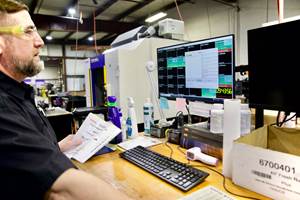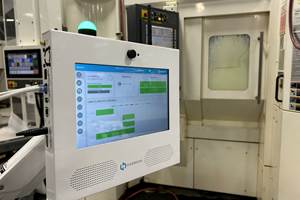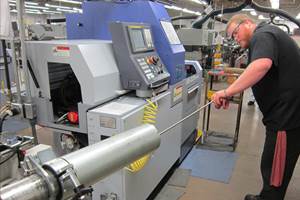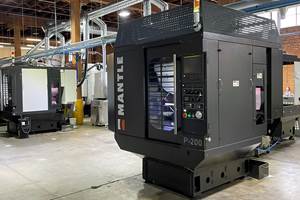D.J. Amici Tool, Inc. is an eight-person shop in Algonquin, Illinois, a northwestern suburb of Chicago. Recently, the shop adopted a system of modular precision boring tools and has seen a significant improvement in productivity. For example, the shop had been using dedicated tooling to bore four holes 2 inches in diameter and 2 inches deep on one of the steel die sets Amici machines for its customers. This job had been taking more than four hours, according to Don J. Amici, the owner.
The shop had been running this job at a speed of 150 rpm and feed rate of 0.5 ipm. With the new tooling, it runs at 1,432 rpm and 5.72 ipm. Increased productivity is not the only benefit the shop is obtaining from the switch to precision boring tools. “We have seen a 120-percent improvement in quality,” says shop manager Fernando Collado. Before trying the new tooling, Amici craftsmen devoted hours to holding concentricity and achieving repeatability, Mr. Collado reports. Now, he says, they are getting used to first part precision and consistent repeatability.
The company prides itself on getting jobs done right and delivering them on time. Its return rate is close to zero, according to Mr. Collado, and its on-time rate is 99 percent. Customers include makers of electronic components, concrete forms, aluminum and vinyl home siding.
Amici Tool has doubled in size over the past two years. The company originally started in 1978 in the Chicago suburb of Bensenville. First came a move from a 2,500 square foot shop in nearby Crystal Lake to a 6,500 square foot facility in Algonquin. Then the company began a move from manual production to automated CNC equipment. Half the new shop’s manufacturing area is now devoted to automated production on three new wire EDMs (electrical discharge machines) and two CNC vertical machining centers.
Die sets that required a week to machine on the manual side are now completed in a day, according to Mr. Collado. Amici is running jobs at speeds and feeds that are much higher than its earlier capabilities. Mr. Amici says that its move to CNC equipment has enabled his shop to charge the customer less, build more business and produce a better profit as a result.
About 20 percent of the company’s machining is boring, a higher percentage than found in the average shop, Mr. Amici believes. He cites growth in its major markets with today’s strong economy as a contributor to his company’s growth, along with the company’s increases in productivity.
Acquiring the modular boring tool system, from KPT/Kaiser Precision Tooling, Inc. (Elk Grove Village, Illinois) is an example of how the shop is taking full advantage of its investment in CNC equipment. The shop is currently using the precision boring heads and indexable drills from this modular system. It plans to try the system’s spade drills. The system also includes twin cutter heads, single cutter finishing heads, balanceable and automatic balancing heads for high speed applications, tapping attachments, chamfering tools, modular toolholder components and a line of accessories.
Although Amici Tool has been growing, Mr. Amici intends to watch this growth carefully. “If you get too big, you lose control,” he explains. He says the industry has seen an increase in the number of smaller tool and die shops in recent years, in part because creating dies is custom work.
Related Content
A Career at the Top Helps Rebuild a Job Shop
A new approach to management propels expansion into Swiss-type and multitasking machining work.
Read MoreCan Connecting ERP to Machine Tool Monitoring Address the Workforce Challenge?
It can if RFID tags are added. Here is how this startup sees a local Internet of Things aiding CNC machine shops.
Read More6 Tips for Training on a Swiss-Type Lathe
There are nuances to training a person to effectively operate a Swiss-type lathe. Derek Korn, Production Machining’s editor in chief, shares suggestions from a CNC machine shop.
Read MoreIn Moldmaking, Mantle Process Addresses Lead Time and Talent Pool
A new process delivered through what looks like a standard machining center promises to streamline machining of injection mold cores and cavities and even answer the declining availability of toolmakers.
Read MoreRead Next
3 Mistakes That Cause CNC Programs to Fail
Despite enhancements to manufacturing technology, there are still issues today that can cause programs to fail. These failures can cause lost time, scrapped parts, damaged machines and even injured operators.
Read MoreThe Cut Scene: The Finer Details of Large-Format Machining
Small details and features can have an outsized impact on large parts, such as Barbco’s collapsible utility drill head.
Read More











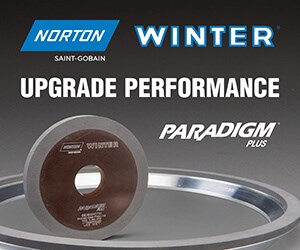
.png;maxWidth=300;quality=90)


